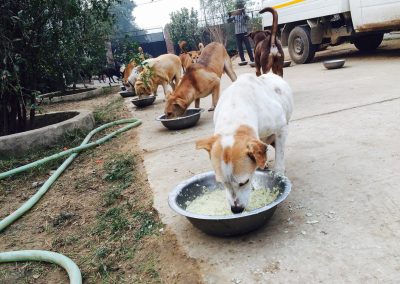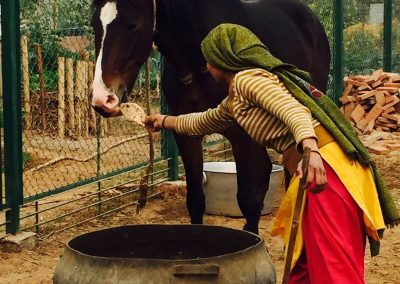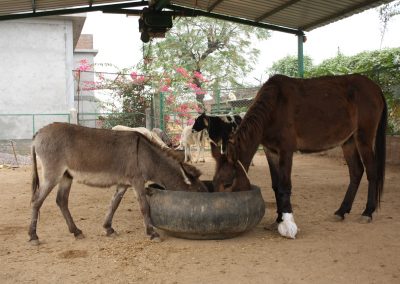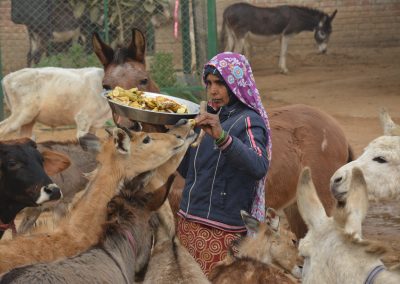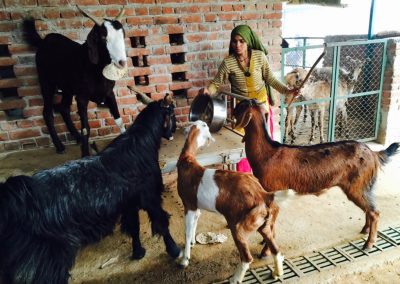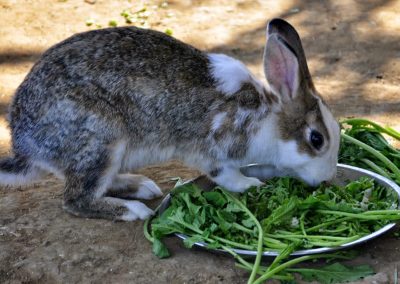Dogs
India has the largest population of stray dogs in the world. It is illegal to cull them under a 2001 law that was up held in the Supreme Court of India in January 2017. Given the massive population of both dogs and people in India there is increased pressure on urban spaces with a conservative estimate of 4,00,000 dogs living in the Capital alone. ACGS has approximately 380 dogs and pups as permanent residents at any given time. Most of them come from the urban streets of Delhi where they have either been hit by cars or stoned, others are abandoned, rescued from cruel people or circumstances, or rejected by breeders. They are old, sick and injured or too young and orphaned to fend on the streets for themselves. They are either in the process of healing or have healed. However, none of them are capable of looking after themselves on the street again. Our efforts to find homes for them are not always successful but we keep trying and sometimes we succeed. One of our future aims is to strengthen our adoption programme.
Our medical team and visiting vets are constantly attending to their physical needs, but apart from that the resident dogs are de-wormed every three months. Constant de-ticking and protection from other mites is a big part of our dog care.
Every dog is sterilised before becoming permanent resident. ACGS is opposed to any multiplication of its residents.
Cats
ACGS has a playful and frolicking cat community. Orphan kittens, wounded and disabled cats now live in an open space which we call the cattery. They are free to roam anywhere within the compound, climb trees and rooftops and play in the gardens. This model of an ‘open cattery’ seems to work in creating happy cats!
Emus
The emu meat experiment in India was a disaster from the word go. Emu farming in India was encouraged as a pyramid selling scheme over the last few years as a source of income. Unfortunately, in Haryana and Uttar Pradesh, emu meat and eggs did not become popular. Emu farmers just abandoned these lovely affectionate birds which are not native to India. Born and raised in captivity, thousands of them became diseased and died or were hit by cars or hunted by local predators. ACGS rescued some of these birds from the Gurgaon Toll on the Jhajjar highway. Others were brought to us by individuals who rescued these large birds which were being sold door-to-door for meat in the by lanes of Delhi! The emus of ACGS actually come to you and rest their heads on your shoulders, making an affectionate sound akin to purring!
Emus, which are running birds, have a fairly large run of the sanctuary and their own shallow slush pond to play in.
The Herbivores
At any given point of time, a visitor to ACGS will see our goats, cows, horses, buffaloes, mules and donkeys, happily lazing in the sun, chewing the cud, gambolling in the shadows or wallowing in our dirt pond. Many of the cows are road accident victims and some have, unfortunately, to have an irreparable leg amputated. In addition since they forage off garbage their intestines are blocked by kilos of plastic bags that they are unable to digest and are required to be operated upon. They all live happily together in the largish central space of the campus. All the males are castrated, so there is no risk of hooved off springs!
Other Residents
Rescued ducks, peacocks, roosters, geese, turkeys and rabbits are some of the other permanent inmates.
From Wounded To Well
ACGS’s clinic is fairly well equipped to handle routine physical injuries, minor surgeries, dressings, vaccinations, amputations and sterilisations. The clinic looks after the medical needs of the resident animals as well as outpatients brought in by people from the surrounding villages.
Facilities at the clinic include :
- Two operating theatres for small animals (dogs and cats) and complete medical care infrastructure.
- Medical check-ups for every animal that comes to ACGS.
- Emergency first aid like saline drips, wound suturing, dressing and bandaging, skin care, injections, maggot treatment and minor orthopaedic care.
- Blood transfusions, amputations, minor surgeries, spay/neuter etc.
- Visiting vets and supervising vets. The entire medical/clinical project is under the supervision of Dr. Devi, also a Board Member of ACGS.
- Experienced team of senior and junior para-vets, compounders and helpers.
Regular care for resident animals
- Regular deworming every 3 months for canines, felines and large animals
- Monthly de-ticking and de-lousing. Tick medicines.
- Routine treatment for various medical issues
ACGS follows a very strict and rigorous ABC (Animal Birth Control) programme developed by WHO as the only practical solution to control the street dog population and eradicate rabies Dogs and cats are spay-neutered and male herbivores are castrated.
Rural ABC Programme
ACGS is situated right in the middle of a rural area in Haryana. Here, there is virtually no concept of sterilising their animals. We see several hundred dogs, severely malnourished, diseased and dying puppies and stray dogs everywhere. Many die of road accidents.
Animal birth control in rural India is prescient. ACGS expanded its own campus ABC program to include the village dogs, by adopting one village at a time. We have neutered and spayed most of the dogs in a radius of 5 km. Unfortunately, because of lack of resources and infrastructure, we had to discontinue this programme. Villagers have askedus to restart the ABC programme, for which we currently lack the funds.
- The Herbivores- (horses, goats, cows, buffaloes, donkeys, mules) – fodder, hay, chickpeas, jaggery, khalli, vegetables , millets, fruits, salt licks, wheat bread (chappatis).
- Dogs – rice, meat, vegetables, milk, eggs, chappatis, bread and biscuits.
- Emus – millets, greens like spinach, apples.
- Ducks/hens/pigeons/turkeys/peacocks/geese – millets, sprouts & greens
- Cats – dry food, meat & rice, fresh fish
- Rabbits – millets, sprouts, greens, vegetables & fruits.
In addition ACGS provides the residents with
- Supplements : calcium, protein and vitamins as and when required.
- Treats : Everyone afternoon the animals are given “ treats.” A small portion of every animal’s favorite food is given at about 4 pm by way of a special treat like Bananas and Rotis.

